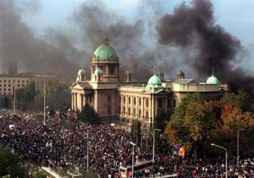
The local media – 11 years later
Six years ago, I attended a meeting between local TV stations where it was discussed how to produce joint interviews. The idea was to broadcast the interviews live on all TV stations at the same time, to invite the most attractive guests in the media scene, and to have the interviews made by the most renowned journalists. Representatives of both private and state-owned media were present at the meeting. After some nervous squirming, caused by the possibility that some interviewers might ask inconvenient or difficult questions which could embarrass their bosses, the participants in the meeting agreed that such joint interviews should be produced. However, what followed was a heated argument about the time slot for airing. One of the proposed time slots was rejected because a local TV stations broadcast its best-rated programme (about health care!) at that time. The meeting ended without any results after the director of a major TV company from South Serbia said that the interviews could not be aired at 21.00 because the president of his municipality went to sleep at 21.00 each evening.

Photo: FoNet
Of course, the interviews have not been realized. I was left wondering where all those famous, pre-October 5 "local media" disappeared. The station that adapted its programme to the physiological needs of the president of the municipality was one of the famous members of ANEM – it was one of those stations which were the oasis of professional journalism in Serbia during the nineties.
I remembered the words of the state secretary of the Ministry of Culture, Dragana Milicevic-Milutinovic. She said that the responsibility for today's position of journalists and the media in Serbia, which was perhaps the worst in the recent history of the country, lied not only on the state and the lack of legal regulations, but also on the journalists growing weary. "During the nineties, there was no freedom of the media, but we had free and courageous journalists. You will have as much freedom as you can win for yourselves, and by winning your own freedom, you will freedom for others as well". Her words made me think, and even slightly angry.
Why? Because freedom in the local media scene today amounts to "courageous" pandering to each whim of the local municipal presidents – who have made a habit of seizing media outlets. The local media serve as an employment agency for all "admirers of journalism" who have nothing better to do or enjoy being in front of the camera; some of them sometimes even dare to ask their interviewees a few difficult questions.
Although the Radio-Television Pancevo is even today a bit different from most other local media outlets, citizens keep asking where is the spirit of the station "which existed before the October 5, 2000".
Her words made me think because to this day we have not succeeded in creating a trade union – a simple organization which could afford to offer financial support to dismissed journalists; statements of support from journalistic associations mostly make me sick.
At the same time, I turned a bit angry, not at Dragana as a journalist, but at Dragana as the legal successor to all post-October 5 governments.
This is why.
Do the employees in the local media have any idea whether their company would still exist in three years from now, or even 10 months?
How is it possible that 11 years after October 5, 2000 we are still discussing about what we should do with the media?
How is it possible that the Law on Information was adopted almost three years after October 5, 2000?
How is it possible that no one could understand that auction sales would mean death verdict for the media?
How is it possible that someone thought it would be sensible to issue so many licenses to media outlets in Serbia that even Switzerland would not be able to support them all?
How is it possible that not a single national station has ever interviewed any of the dismissed editors of local media outlets?
How is it possible that no one understands that all media outlets, even the local ones, should have been forbidden from broadcasting for free the advertisements of ministries and various campaigns in "service of the public"?
The list of questions could be much longer, but those who have acted on behalf of the state in their role as politicians or "media experts", were certainly fully aware of the consequences of their actions. Therefore, the effects must have been intentional. Of course, we are not talking about 'organized crime'; instead, the local media have been the victim of converging individual interests. Independent, professional local and regional media outlets which are free from special interests would constitute a competition to major media outlets at the national level, as well as a thorn in the side of politicians. What choice do we have? Well, we must keep fighting.
Nevena Simendic
MC Newsletter,
October 7, 2011
View all comments (0) Leave a comment
Published comments contain opinions that are not the opinions of Media Center. Responsibility for the content of messages and their accuracy lies on the website users who posted them.
 |
| The content of this article does not necessarily reflect the view of the Media Center. The author bear full responsibility for the content of the text. |





